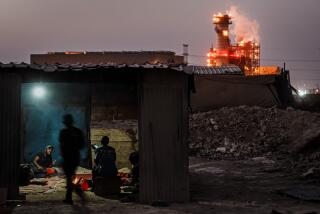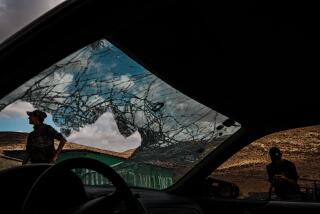Kuwaiti Residents Fearful of Attack From Either Side : Occupation: Resistance to the invaders is continuing. There is no sign of any civil administration.
WASHINGTON — A week after the Iraqi invasion, there is no sign of any civil administration, Kuwaiti or Iraqi, and Kuwait’s 1.7 million residents are nervous about their fate, according to information received by the Washington Post.
The real fear among Kuwaitis and Westerners in Kuwait, according to information about events there this week, is of an attack to oust the Iraqis, or of retaliation against them if Baghdad, the Iraqi capital, is attacked.
The inhabitants of Kuwait city ignore traffic lights in the absence of police, but electricity and water continue to flow and the Kuwaiti flag still flies over the ruined Dasman Palace.
People are burning their garbage in the streets, and roads are littered with the debris of warfare--burned-out armored cars and trucks--and with dozens of civilian cars abandoned in panic by their owners in the early days of the occupation. Some of the vehicles have been crushed by tanks.
Kuwaiti resistance to the Iraqi occupation continues. Snipers regularly fire at Iraqi soldiers. Automatic weapons fire has been heard every night since the invasion. One member of the Kuwaiti resistance said its strategy is to stage hit-and-run attacks against Iraqi soldiers, with the aim of creating confusion.
Occasional demonstrations have been staged, many by women. And streets have been plastered with signs bearing photographs of the ousted emir and crown prince, Sheik Jabbar al Ahmed al Sabah and Sheik Saad al Abdullah al Sabah.
People spend their days visiting friends or looking for increasingly expensive food amid confusion over the status of the once mighty Kuwaiti dinar. Banks are closed, and residents say ration cards have been introduced in some areas.
A U.S. official in Washington told The Times that Hussein is “turning Kuwaiti society on its head” by giving power to the lower classes. “A lot of scores are being settled,” the official said.
In providing one of the first authoritative accounts of the Iraqi occupation, he said: “Homes are being broken into, people are being raped, people are being abused.” The official said the Iraqi army is believed responsible for only a small proportion of the violence: “The Kuwaiti underclass is now on top.”
Among those reportedly involved in the violence, the official said, are poor Iraqis sent to Kuwait to populate and occupy the conquered country. He said many of the Iraqis reportedly have been seizing and occupying the homes and apartments of wealthy Kuwaitis.
Iraqi soldiers are using Iraqi dinars to buy goods at the rate of 1-to-1 with the Kuwaiti dinar. Before the invasion, one Kuwaiti dinar was worth 10 Iraqi dinars on the black market, but shops are obliged to accept Iraqi money at the new rate.
A few electronics and jewelry shops have been plundered in the city center. But there have been only isolated instances of looting.
The annexation of Kuwait by Iraq following the invasion was hardly a surprise to people in Kuwait. The interim government of Iraqi military officers took no measures of any kind and was clearly never more than a stopgap prior to Iraq’s annexation of Kuwait. Troops have settled in, apparently to stay, building shelters at their beach encampments to provide relief from the sun in temperatures approaching 90 degrees in the shade, and filling sandbags for their positions.
New government ministers have not said anything themselves. All of their statements come from Iraqi television commentators.
So far there has been no sign of Kuwaiti collaboration or of people returning to work as requested by Iraq, and Iraq has yet to impose its fearsome internal security appartus on Kuwait. Baath Party officials from Baghdad, however, have moved into at least one city center hotel.
Many members of the royal family and of the liberal opposition are in hiding.
Many Kuwaitis were already out of the country for their summer holidays, and others have already managed to flee to Saudi Arabia. The majority of the population are foreigners anyway, not just the few thousand Westerners implicitly threatened by Iraq but also hundreds of thousands of Arab residents and Asian migrant workers who kept the economy going.
The 40,000-strong Filipino community, for one, is in difficult straits. About 1,500 Filipinos are camped out at their embassy, which has no direct communications with Manila, and they are short of money to buy food.
Many foreigners had their savings at local banks and cannot now withdraw them. “I have 1,300 dinars in the bank,” said one Egyptian hotel worker. “What will my family say when I go home--if I go home?”
Western embassies in Kuwait are negotiating with officials at the Iraqi Embassy but so far have made little headway in arranging an evacuation of their nationals. Diplomats say the real decisions will be made in Baghdad and that talks may be complicated by the refusal of their countries to recognize Kuwait as part of Iraq.
Asian and Arab residents of Kuwait are also awaiting evacuation.
Although Iraq faces the immediate problem of how to organize a massive evacuation of up to 1 million people, in the longer term an exodus will make it easier for President Saddam Hussein to colonize the country he regards as part of his own. Already busloads of Iraqi civilians have been seen in Kuwait city, and in some cases they are said to have occupied apartments.
More to Read
Sign up for Essential California
The most important California stories and recommendations in your inbox every morning.
You may occasionally receive promotional content from the Los Angeles Times.










